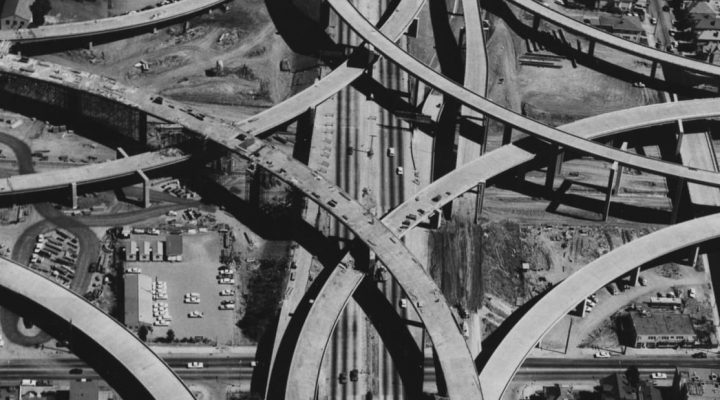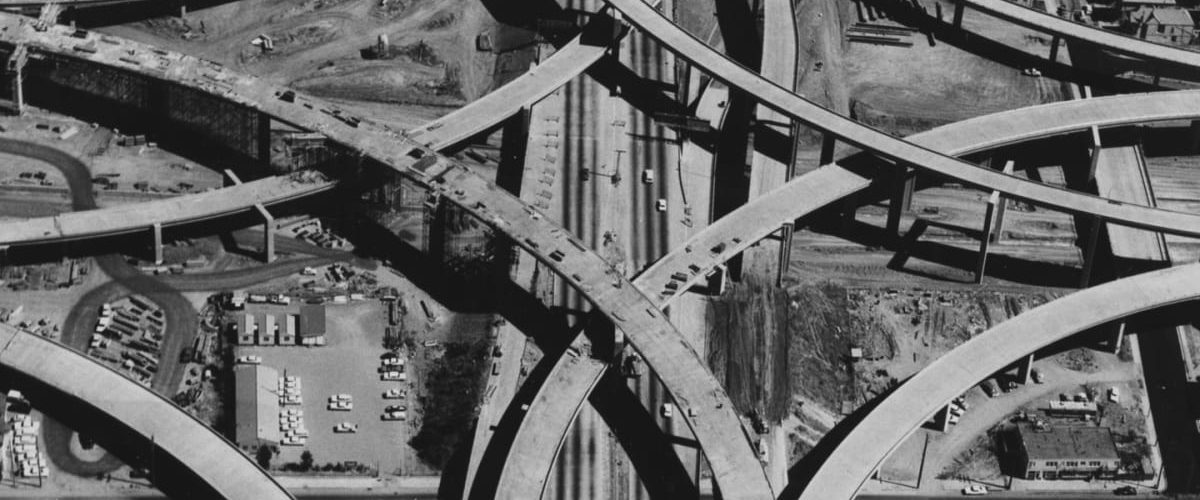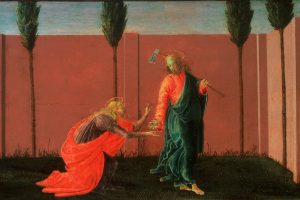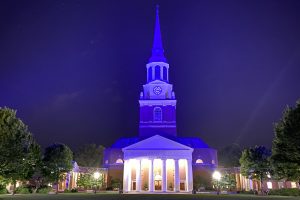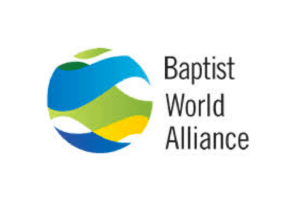“You rarely change things by fighting the existing reality. To change something, build a new model that makes the existing model obsolete.” —Buckminster Fuller
Learning to tie your shoes in a new knot is really difficult. We spend years learning how to tie our shoes so they fit just right. We don’t think too much about wearing shoes on our feet — they become a part of who we are. You might not even think about tying those knots now; it just happens. You may not even remember where you learned the motions in the first place (I know I can’t).
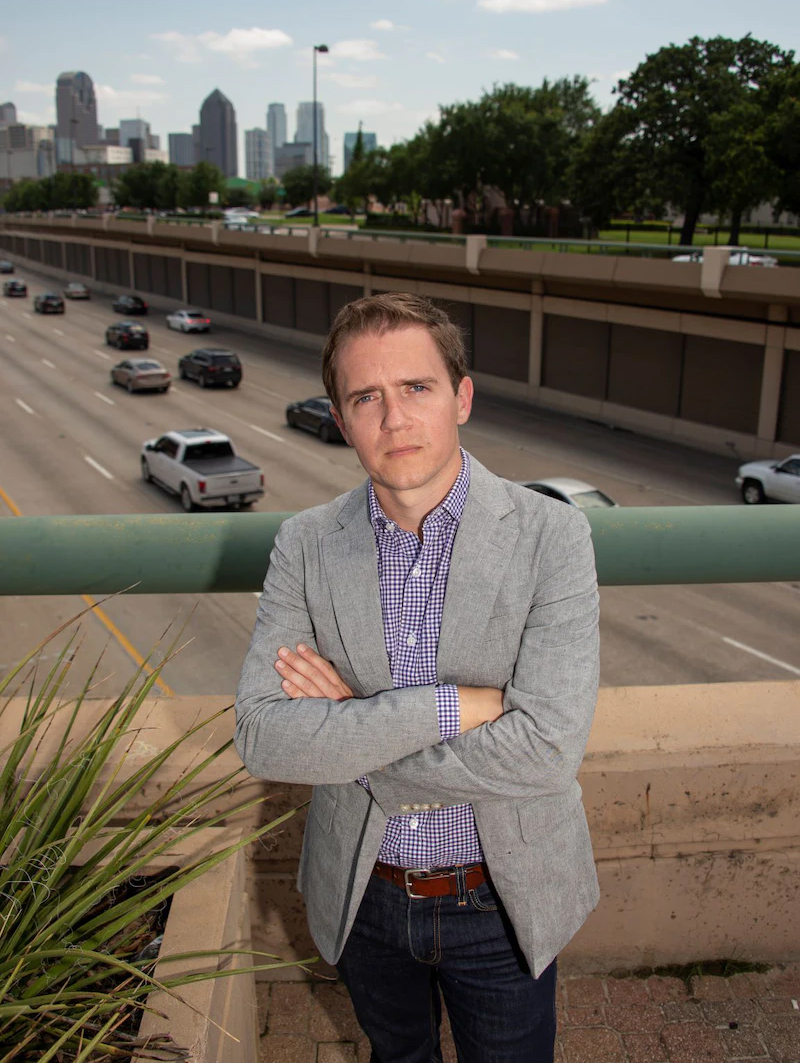
Collin Yarbrough stands on an overpass above Dallas’ Central Expressway. Freedman’s Cemetery, which was cut off by highway construction, is in the background. (Photo: SMU)
Yet our shoelaces still manage to come untied and trip us up — and we tie the same knots again and again. Because that’s what we do. “It’s how we always do it.”
Through my research on the history of public infrastructure, I have learned that unlearning is just as important (if not more important) than initially learning information. Unlearning requires, and allows space for, reflection on why we do things the way we do them.
Meet Peter Norton
Early in my research, I found myself watching a 2018 C-SPAN recording of a panel discussion on infrastructure development. Yes, I’m that guy. The panel included historians from across the transportation spectrum, from airports to highways. Peter Norton was one of those panelists and my reason for watching. His opening lines hit me like a hammer:
I think that (our) infrastructure future is based on a past we don’t understand very well. In fact, more than that, I would say the past we have grown up with about surface transportation (roads, highways, etc.) in this country is a past that was created, in part, to justify the status quo. I don’t think we can understand the status quo or how we got there until we reexamine the past.
“I don’t think we can understand the status quo or how we got there until we reexamine the past.”
Norton brings up an important point. When we talk about infrastructure, we usually talk about building something new or fixing something existing. We don’t talk much about the past. The narrative often lost is the history of the infrastructure in relation to the people impacted by it. Questions like:
- How did these roads/buildings get there?
- Who designed them?
- What was there before them?
- What needs did they serve?
- Who were they intended to serve?
All these are questions of the past, bygone days, days that couldn’t possibly be relevant to anything in the present context, right?
‘Conscious incompetence’
Norton’s argument resonates with me as I stumble through the learning, unlearning and relearning journey I’ve embarked upon. I try to wrap my head around decisions I made as an engineer and that the City of Dallas made in the past. I have worked hard while creating a book to get all of the information correct, to hear the right voices — only to find out I still know relatively little and had a backward understanding. Some people call this “conscious incompetence.”
I don’t think this is reason to stop engaging with the past. In fact, it is the very reason to further pursue history and bring it into the present. Learning, unlearning and relearning is the essence of narrative change.
History often can be treated as a burden — and ignored as such. This is an easy trap to fall into. I know I dealt with this notion of ignoring versus understanding many times while trying to redesign pressure stations on pipelines: I wanted to erase the old piping and replace it with new, pretending the old station never existed. It took significantly more effort to understand why the station was designed a certain way and to learn from the past designs.
“Infrastructure also wears its history in ways we may or may not see.”
Just as we are products of our own upbringing, infrastructure also wears its history in ways we may or may not see.
What do you see?
Norton’s views on the importance of understanding the historical context of infrastructure were shaped in his twenties while working for the Historical Society of Delaware in Wilmington during the 1980s. Surrounded by photographic negatives from 1910-1960 in the basement of a former bank building, he saw glimpses of Wilmington’s past. The negatives were reverse images in more than one sense: they revealed a city drastically different from the one he saw on his bus ride home from work.
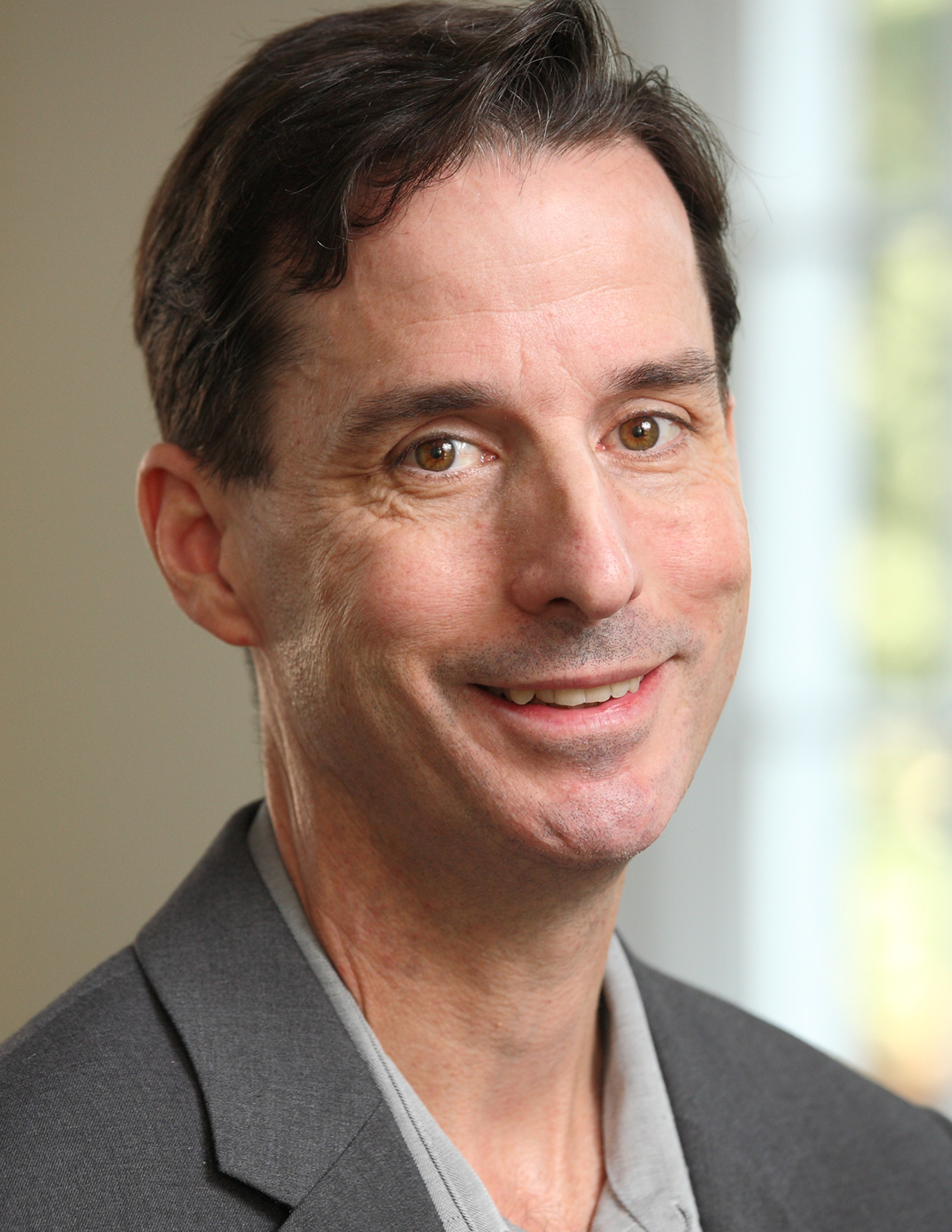
Peter Norton
I read about this experience in the introduction to Norton’s book, Fighting Traffic, and had the chance to talk with him about this period. In our conversation, he noted he first felt “like a resident alien in (his) own country” because he was “an adult but not a driver.”
As he rode the bus home each day, it became clear to him what values were designed into the world around him. “And that gave me a perspective, where it was quite obvious that the world was designed on the assumption that you have a car … so that was very personal,” he said.
“The verb that came to my mind then was ‘erased’ — like they took a big rubber eraser and erased it. But … ‘paving away’ is clearly what it was.”
What he saw in the photographs was a Wilmington that no longer existed — particularly, predominantly Black areas of Wilmington that were more or less paved away into parking lots, roads and driveways. “The verb that came to my mind then was ‘erased’ — like they took a big rubber eraser and erased it. But … ‘paving away’ is clearly what it was,” Norton recalled.
It was at this intersection (no pun intended) of personal and imagined experiences where Norton saw a “striking contrast to what (he) was getting from the literature” because “the engineering literature was pretending that this was all objective engineering.” Further, Norton said, “Once you build a certain boundary around what you can consider, it starts to make internal coherence, but it makes no external coherence.”
In other words, you create an echo chamber.
Yielding to ‘motordom’
Norton saw a disconnect between the historians and what he encountered in primary sources. Historians treated infrastructure expansion as an inevitable response to car culture, building a boundary around what could be considered.
Norton’s curiosity narrowed in on city streets. Mainly, he wanted to understand where the shift in the nature of streets went from caring for the pedestrian to caring for cars and drivers.
In my experience, from an early age, the street was typically approached with caution. It was an accepted fact. “Look both ways before crossing the street,” they would say. It never occurred to me questioning this narrative was an option. Thankfully, it occurred to Norton.
“It never occurred to me questioning this narrative was an option.”
As many historians would, he researched works spanning the past century, gathering a broad narrative. He found significant opposition to the coming age of the automobile in his primary sources. We often hear stories where the automobile was welcomed with open arms, a savior of humanity. The research showed the dominant social norm of walking and crossing streets was becoming an impediment to the needs of the automobile — a wide street.
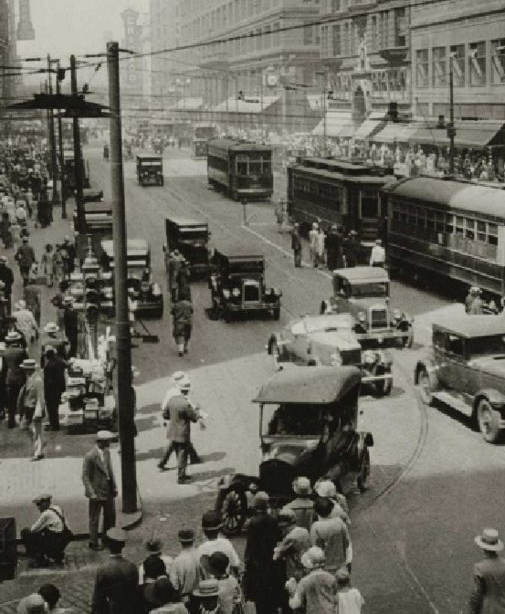
Early motorists in Chicago
Early 20th century streets often were crowded, busy and filled with a multitude of transportation types (pedestrians, railcars, horse and buggy) — a negative narrative increasingly touted by city officials, engineers and the auto industry. Amid the fights for pedestrian safety and automobile rights came a shift in the status quo.
In the United States, the turn of the 20th century saw an increasing number of automobile-related injuries and fatalities to pedestrians. Pedestrians banded together to shape the public safety movement, even going so far as erecting monuments to memorialize children killed by automobiles and holding Safety Week parades, which likened drivers of automobiles to Satan. Definitely no miscommunication there.
The auto industry, anonymously referred to as “motordom,” used stylized models by Bel Geddes to paint a picture of a future enriched by the automobile. Shell Oil’s “City of Tomorrow” and GM’s prophetic “Futurama” exhibits at World’s Fairs introduced people to the idea that superhighways were only 20 years away — that 1960 was within reach: automobiles moving around freely, at great speed, with pedestrians nowhere in sight.
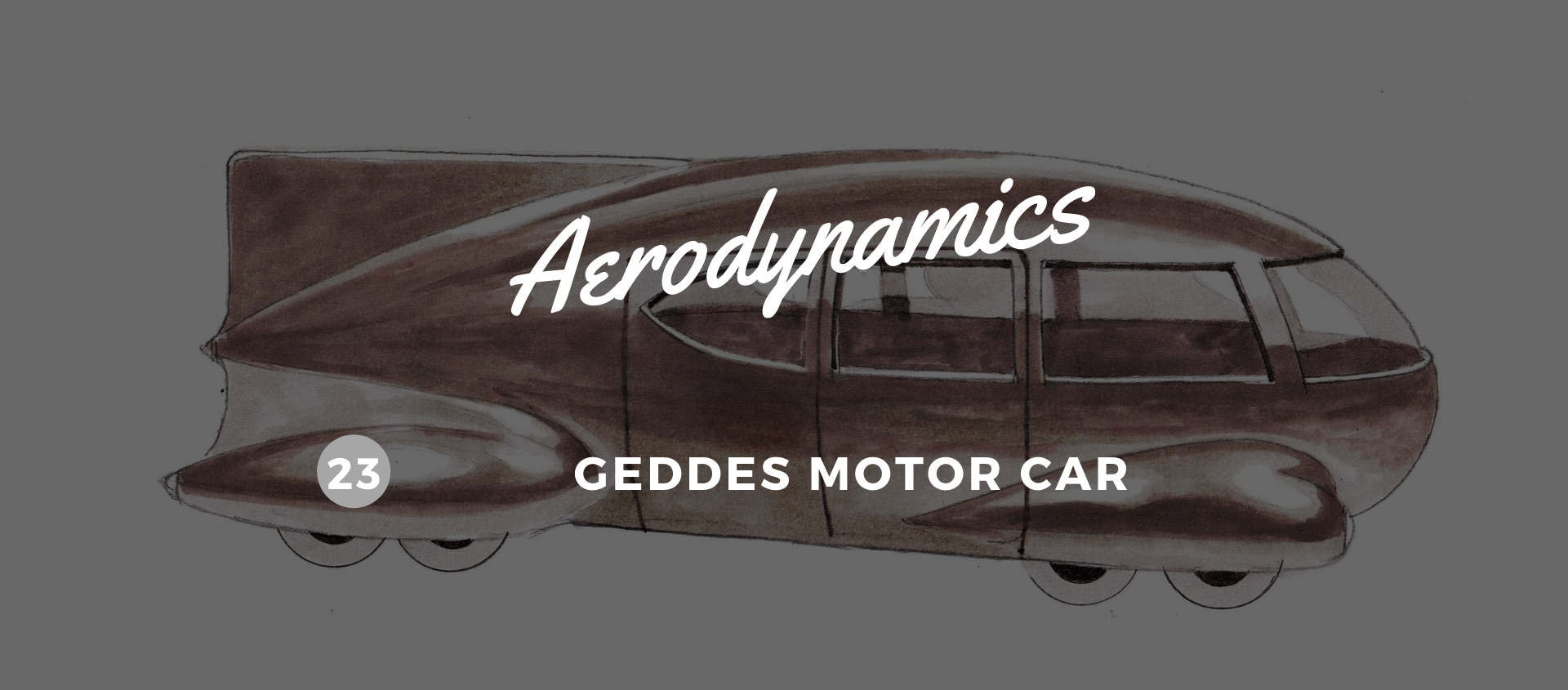 The automobile was not the problem; pedestrians and people were the design flaw. A foolproof highway was motordom’s manifesto.
The automobile was not the problem; pedestrians and people were the design flaw. A foolproof highway was motordom’s manifesto.
The road narrative
The manifesto eventually manifested. Many, not all, U.S. cities saw the interstate highway system crisscross the country and infiltrate their urban cores, dividing up neighborhoods in the name of safety, efficiency, traffic relief and the American Dream.
The road narrative was rewritten over a 30- to 40-year period by a combination of automotive interests and public policy coupled with strong public relations. We bought into the self-fulfilling prophecy that we needed automobiles to be full participants in the American story and had a duty to support whatever infrastructure made that happen.
“We bought into the self-fulfilling prophecy that we needed automobiles to be full participants in the American story.”
We still see these influences today with popular engineering assumptions that adding more lanes will reduce traffic when they actually can create more. The continuation of our inherited highway and infrastructure legacy impacts the ability for infrastructure to be used for other purposes and remain resilient in the face of changing conditions.
As Norton told me, “If you start off with the wrong theoretical approach, it doesn’t matter how meticulous you are — you will remain trapped.”
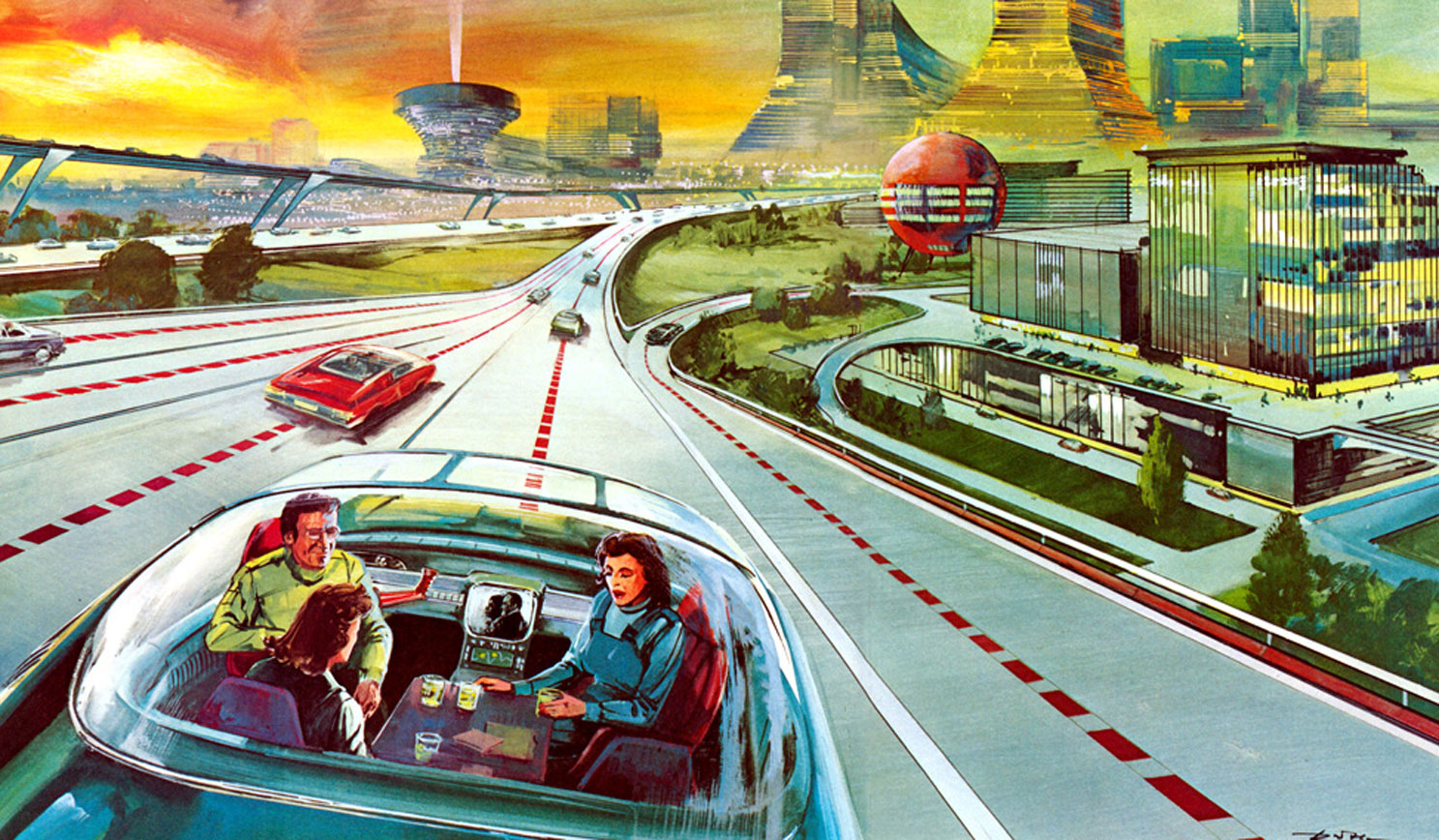
Norton’s book opens with an epigraph from a 1922 issue of Engineering News‐Record. A quote at the bottom of a section titled “Motor Killings and the Engineer” reads, “The obvious solution … lies only in a radical revision of our conception of what a city street is for.” Norton feels hope in the sense that if we were able to shift the social construction of the street into one dominated by automobiles, then there is hope we can change it again. I’d like to think we are just at the beginning of a new cultural shift as well.
“We had a legacy before of vast quantities of urban rail networks … so, even infrastructure can change. I think what has to change first is the ideology behind the infrastructure,” Norton said. Fundamental narrative shift goes beyond “questioning the details, you have to question the fundamental assumptions.”
“Just like how Copernicus … had to question the fundamental assumption that the earth is the center of the universe, and only then could the other things get worked out,” Norton recalled.
Challenge assumptions
Our work of creating more equitable cities follows a similar trajectory.
By challenging our fundamental assumptions, smaller assumptions and actions that tend to perpetuate systems of injustice can surface and be examined, allowing for transformation of ourselves and our cities.
The words of writer and activist Audre Lorde capture this sentiment well:
The master’s tools will never dismantle the master’s house. They may allow us to temporarily beat him at his own game, but they will never enable us to bring about genuine change.
Critical reflection of our assumptions shifts the historical narrative from “this is how we’ve always done it” to “this is how we did it” and toward “this is how we’re going to undo it and rebuild it.” For that, we need a different set of tools.
No more tying the same knots. We need different shoes.
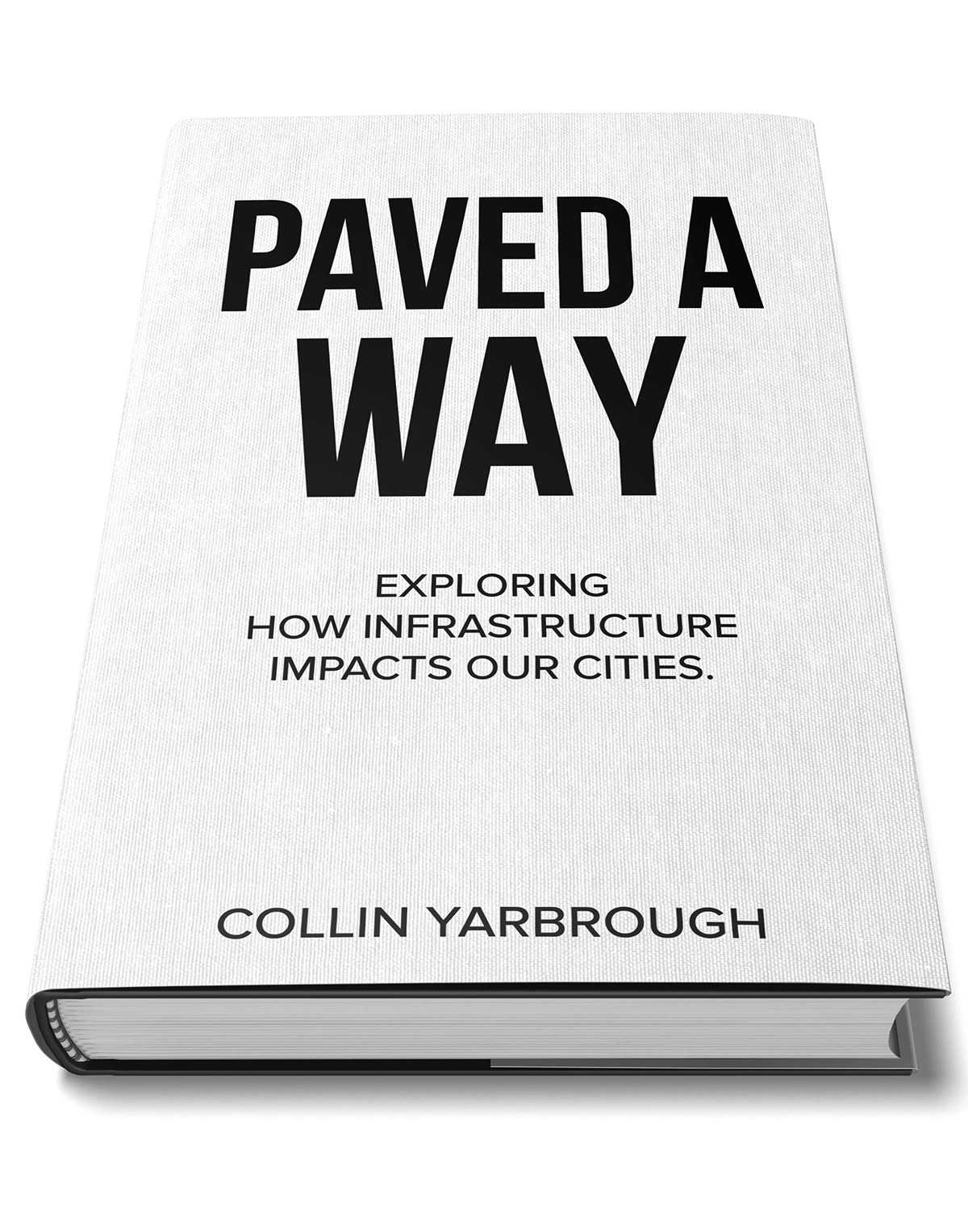 Collin Yarbrough is Ph.D. student in engineering at Southern Methodist University. For the past two years, he has been named a Dwight. D. Eisenhower Transportation Fellow with the Federal Highway Administration. This article is excerpted from his book, Paved A Way: Infrastructure, Policy, and Racism in an American City. His research focuses on how highways and other infrastructure projects disenfranchise minority groups and reshape cultures and communities. He is a deacon at Wilshire Baptist Church in Dallas and chief operating officer of a nonprofit called Full Circle Bakery.
Collin Yarbrough is Ph.D. student in engineering at Southern Methodist University. For the past two years, he has been named a Dwight. D. Eisenhower Transportation Fellow with the Federal Highway Administration. This article is excerpted from his book, Paved A Way: Infrastructure, Policy, and Racism in an American City. His research focuses on how highways and other infrastructure projects disenfranchise minority groups and reshape cultures and communities. He is a deacon at Wilshire Baptist Church in Dallas and chief operating officer of a nonprofit called Full Circle Bakery.
Related articles:
The folly of naming a place you don’t understand | Opinion by Greg Jarrell
It is impossible to afford rent almost anywhere in the U.S. with a minimum-wage job

